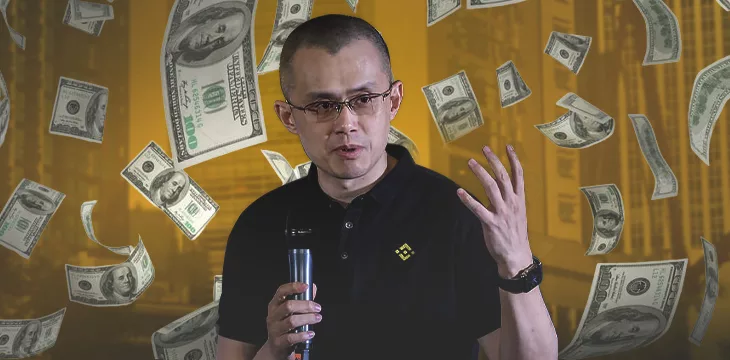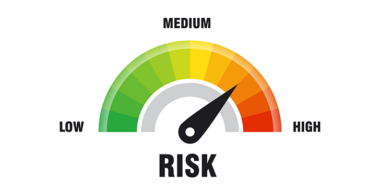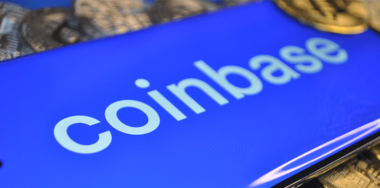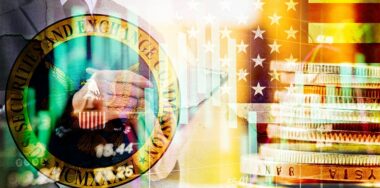Binance and the digital asset exchange’s founder Changpeng ‘CZ’ Zhao have finally been brought to justice by American authorities, but the ripple effects of Tuesday’s plea deals are only just beginning.
On Tuesday, the U.S. Attorney’s Office for the Western District of Washington announced a deal had been reached in which Binance agreed to plead guilty to charges of conspiracy to conduct an unlicensed money transmitting business and to fail to maintain an effective anti-money laundering program; conducting an unlicensed money transmitting business; and violating the International Emergency Economic Powers Act (IEEPA).
As part of this plea, Binance has agreed to pay a $1.8 billion fine and forfeit $2.5 billion in ill-gotten gains. The latter sum includes $1.6 billion in fees generated from trades by Binance’s U.S.-based customers and $900 million representing the value of transactions between U.S. customers and customers based in Iran.
Binance has also agreed not to make any public statement (directly or indirectly) contradicting its guilty plea. In addition, Binance must establish a proper compliance program, the substance of which is to be subject to oversight by an independent compliance monitor for a period of three years.
Ominously (for other Binance-adjacent crypto crooks), Binance has agreed to “cooperate fully with the government in any and all matters relating to the conduct described in the Plea Agreement and the Statement of Facts and any individual or entity referred to therein, as well as any other conduct under investigation by the government at any time during the Term of the Plea Agreement.”
CZ, who made a surprise appearance in a Seattle court to enter his plea, agreed to plead guilty to violating and causing a financial institution to violate the Bank Secrecy Act (BSA), for which he will pay a $50 million fine. CZ is also bound by a similar requirement not to dispute the legitimacy of the crimes to which he’s pleading guilty.
CZ has agreed to step down as Binance’s CEO immediately and will be barred from “any present or future involvement in operating or managing” Binance’s business for a period of three years. Richard Teng—a former Singapore banker who joined Binance in 2021 and this summer was named its head of regional markets—has been named CZ’s replacement.
It remains to be seen how much jail time CZ might face. His charges carry a maximum sentence of 10 years, but the New York Times reported that prosecutors would seek an 18-month prison sentence. CZ has agreed to waive his right to appeal should his prison term not exceed 18 months.
CZ was released on a $175 million bond—secured by $15 million in cash, and his sister put up her $5 million California home—and will be allowed to return to his home in Dubai, although prosecutors plan to appeal this ruling. Channeling his inner Douglas MacArthur, CZ reportedly promised U.S. District Court Judge for the Western District of Washington Brian Tsuchida that “I will return” to face sentencing in another six months or so.
Following the plea, CZ somewhat comically tweeted that he “made mistakes, and I must take responsibility” while stressing that the Department of Justice (DOJ) hadn’t alleged that Binance “misappropriated any user funds” or “engaged in any market manipulation.” CZ claimed that his short-term plans included taking “a break.” In the long term, he hoped to “do some passive investing” in blockchain and biotech startups. (And fraud. Probably something to do with fraud.)
Binance issued a statement that included the eye-rolling admission that the company “is not perfect” but copped to making “misguided decisions” during the frantic growth-at-all-costs strategy employed following its 2017 launch. Honestly, there’s not much point in repeating any more of this twaddle, as it’s the same ‘we love compliance’ nonsense they’ve always spouted and just admitted in court were lies.
‘Is washing drug money too hard these days?’
As we’ve come to expect, the court document detailing Binance’s crimes contains some jaw-droppers in which Binance staff couldn’t shake the habit of taking notes on a criminal conspiracy. In a February 2019 internal chat, one compliance staffer is quoted as saying, “we need a banner ‘is washing drug money too hard these days – come to Binance we got cake for you.’”
In a September 2018 internal chat, a person identified only as Individual 1 said, “its [sic] challenging to use the [anti-money laundering] standards on [Binance].com especially when CZ doesn’t see a need to.”
In terms of facilitating general criminality, between August 2017 and April 2022, there were direct transfers of $106 million in BTC to Binance.com wallets from Russian darknet marketplace Hydra. The transfers only stopped because Hydra was shut down by U.S. and German authorities in April 2022.
From February 2018 to May 2019, Binance processed more than $275 million in deposits and $273 million in withdrawals from coin mixing service BestMixer, which was shut down by Dutch authorities in May 2019.
In terms of facilitating sanctions violations, Binance’s Shanghai-based operations director was responsible for implementing controls restricting or removing users, although since his performance was evaluated based on “his ability to achieve user growth,” his motivations were decidedly mixed, with predictable results.
In May 2019, Binance received a request from Turkish law enforcement targeting a “suspected … Iranian” user’s account. Individual 1 told an investigations specialist that “Iran is very tricky[.] We definitely do not want to acknowledge we have them onboard [a]s our official stance is we gotten rid of all of them(sanctions) and blocked.”
And so on…
Treasury, CFTC pile on
The DOJ’s deal was only one of several such announcements made Tuesday. The U.S. Treasury Department announced a total of nearly $4.4 billion in settlements with Binance—$3.4 billion for the Financial Crimes Enforcement Network (FinCEN) and another $968 million for the Office of Foreign Assets Control (OFAC)—for violations of the BSA and various sanctions programs.
These violations include “failure to implement programs to prevent and report suspicious transactions with terrorists—including Hamas’ Al-Qassam Brigades, Palestinian Islamic Jihad (PIJ), Al Qaeda, and the Islamic State of Iraq and Syria (ISIS)—ransomware attackers, money launderers, and other criminals.”
Binance “willfully failed to report well over 100,000 suspicious transactions that it processed as a result of its deficient controls, including transactions involving terrorist organizations, ransomware, child sexual exploitation material, frauds, and scams.”
In addition to the hefty financial penalties—the $3.4 billion settlement is the largest in U.S. Treasury history—FinCEN’s agreement imposes a five-year monitorship that will grant FinCEN “access to books, records, and systems of Binance” through a third-party monitor. Binance must also ensure a “complete exit from the United States.”
The OFAC settlement is also the largest in its history; the size of the penalty was based on over 1.67 million digital asset trades between Binance’s U.S. customers, those in sanctioned jurisdictions, and other blocked persons. OFAC warned that Binance “could face exposure up to billions of dollars in further penalties if it materially breaches its compliance commitments.”
Meanwhile, the U.S. Commodity Futures Trading Commission (CFTC) reached an agreement with Binance and CZ on the civil charges filed by the CFTC in March for operating an illegal digital assets derivative exchange. That deal will see Binance pay a $1.35 billion civil monetary penalty and disgorge $1.35 billion in ill-gotten gains. CZ will also pay a $150 million penalty to the CFTC (the $50 million DoJ penalty can be applied against CZ’s CFTC fine).
If anyone’s counting along, that’s around $11.5 billion in total penalties, forfeitures and disgorgement of ill-gotten gains. The DoJ magnanimously said it will credit “approximately $1.8 billion” toward the other resolutions, but that would still leave nearly $10 billion that Binance would have to ante up to keep itself from facing even worse repercussions.
Sadly, the CFTC confirmed that “the four actions announced today, in aggregate, require Binance to pay over $4.3 billion in criminal forfeiture, penalties, and fines.” So we’ll just have to wait until Binance tries to pull a fast one on its compliance commitments and those other billions in penalties kick in.
The digital asset sector is trying hard to polish Tuesday’s turd by claiming that Binance’s comeuppance makes it more likely that the U.S. Securities and Exchange Commission (SEC) will approve token-specific spot-based exchange traded funds (ETFs). The SEC previously cited the manipulation of token prices via wash-trading on exchanges such as Binance as justification for rejecting ETF applications. But as we’ll see, wash traders have other laundromats at their disposal. (And the SEC has yet to resolve its civil charges against Binance.)
The other shoe hasn’t dropped
Tuesday also saw representatives from all of the above agencies announce their settlements at a press conference, including Attorney General Merrick Garland, Deputy AG Lisa Monaco, Secretary of the Treasury Janet Yellen, CFTC chairman Rostin Behnam, and others.
Monaco got off some of the most memorable one-liners, including her observation that crypto’s adoption of the tech sector’s ‘move fast and break things’ ethos came with a caveat: “If what you break is the law, there will be consequences.” Behnam remarked on Binance leadership having developed a “cult-like following” regarding their commitment to non-compliance.
The principals fleshed out some details of Binance’s new compliance commitments, including conducting a review of past transactions and belatedly filing all the suspicious activity reports they failed to file pre-settlement.
Among the more intriguing aspects of the DOJ’s settlement is the requirement for Binance to cooperate with U.S. authorities in “any and all matters” regarding its operations “as well as any other conduct under investigation by the government at any time” during Binance’s three-year third-party monitoring period.
Given Binance and CZ’s historical association with and proximity to some of the ‘crypto’ sector’s biggest crooks—Justin Sun, Tether, etc.—the DOJ must be positively licking its lips at the prospect of what it might uncover when CZ is squeezed hard. And with his sentencing still up in the air, there’s a lot of time to ask those probing questions, with CZ’s freedom hanging in the balance.
While we can’t yet say what CZ might reveal, what is certain is that going forward, Binance will ultimately become a pale shadow of its former self. Binance was built on its disdain for know your customer (KYC) and anti-money laundering compliance, a stance it took pains to ensure the criminal underworld understood.
This ‘see no evil’ attitude was the primary factor in Binance’s breakneck growth following its 2017 launch. But with U.S. authorities now having a five-year window into how Binance makes its sausage, criminals will seek out more hospitable climes. Justin Sun’s HTX (formerly Huobi) exchange or Tether’s sister company Bitfinex appear to be some of the more likely sponges to soak up this illicit activity.
But with CZ spilling the beans to save his skin, how long before Tether is hauled up on its own charges? As CZ’s case has demonstrated, his residence outside the U.S. proved no magic bullet against prosecution. If your operations involve U.S. dollars—as Tether’s phantom reserves claim to do—then you’re within the reach of U.S. law.
For Sun, Tether’s Paolo Ardoino, and other (surviving) members of the shrinking Crypto Crime Cartel, we’d like to amend a well-known aphorism: ‘Don’t trust. Panic.’
Follow CoinGeek’s Crypto Crime Cartel series, which delves into the stream of groups—from BitMEX to Binance, Bitcoin.com, Blockstream, ShapeShift, Coinbase, Ripple,
Ethereum, FTX and Tether—who have co-opted the digital asset revolution and turned the industry into a minefield for naïve (and even experienced) players in the market.
New to blockchain? Check out CoinGeek’s Blockchain for Beginners section, the ultimate resource guide to learn more about blockchain technology.








